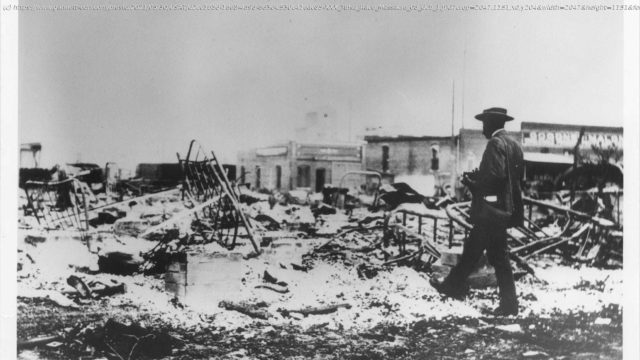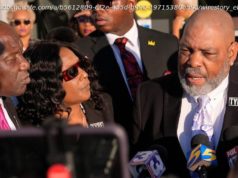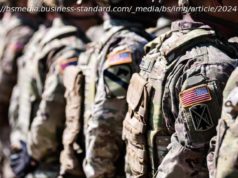Thirty-five blocks were burned and around 10,000 Black people lost their homes. Historians say nearly 300 Black people were killed by the violence. …
Thirty-five blocks were burned and around 10,000 Black people lost their homes. Historians say nearly 300 Black people were killed by the violence. Property damage was between 50 million and 100 million dollars in today’s currency. Over the past 100 years, people in Tulsa have been working together to rebuild Greenwood. Survivors of the massacre and Tulsa political leaders have always asked that the damage be repaired. A group of survivors filed a lawsuit last year seeking reparations from the city of Tulsa and other local government entities. Ohio State University economics professor Trevon Logan sits down with host Claire Thornton to discuss what reparations could fix for people whose lives were upended by the Tulsa Massacre. Professor Logan also explains how different historic economic injustices have lingering effects on today’s society and our country’s overall economic well being. Claire Thornton: Hey there, I’m Claire Thornton and this is Five Things. It’s Sunday, May 30th. The Sunday episodes are special. We’re giving you more from in-depth stories you may have already heard. May 31st and June 1st, 1921 were a nightmare for Black residents of Tulsa, Oklahoma. During the Tulsa massacre, a white mob descended on a large lack neighborhood called Greenwood. It’s one of the worst cases of racialized violence in our country’s history. The Black community in Greenwood was full of businesses and financial opportunities. It was entrepreneurial, creative and people achieved economic stability and prosperity. Then whites destroyed everything.35 blocks were burned and around 10,000 Black people lost their homes. Historians say nearly 300 Black people were killed by the violence. Property damage was between 50 million and 100 million dollars in today’s money. Monday is the 100 year anniversary of the violence. Over the past hundred years, people in Tulsa have been working together to rebuild Greenwood, but as time goes on the truth about the massacre and the damage falls further into the past. Survivors of the massacre and Tulsa political leaders have always asked that the damage be repaired. Claire Thornton: A group of survivors filed a lawsuit last year seeking reparations from the city of Tulsa and other local government entities. I sat down with professor Trevon Logan, one of the country’s foremost experts on economic reparations to discuss what reparations could fix for people whose lives were upended by racialized violence. We talked a bit about the Tulsa massacre, but Tulsa is only one example of how systemic racialized violence destroyed economic resources. Professor Logan also told me about how all sorts of different economic injustices have lingering effects on society today and our overall economic well-being. Here’s our conversation. Claire Thornton: So I’m joined by professor Trevon Logan, the Hazel C. Youngberg Trustees Distinguished Professor in the Department of Economics at Ohio State University. Professor Logan, thanks so much for being here. Trevon Logan: Thank you for having me. Claire Thornton: So May 31st is the 100 year anniversary of the Tulsa massacre. At USA TODAY in our coverage surrounding that anniversary, we’re focusing a lot on reparations. For folks listening, reparations are something that’s done to repair a harm that was caused in the past or restore justice in some way. Would you agree with that professor Logan? How else would you define reparations? Trevon Logan: I think that there are a couple of definitions of reparations and it depends in this particular case, racial reparations we’re discussing, depends on the perspective when one’s to think about what the reparations will be for. So certainly there’s a case to be made for reparations for enslavement that will be due to the descendants of slaves. But it’s also important to recognize that slavery was not the end of the process of racial discrimination and racial oppression. And so the other aspect of reparations are for the continual harms that were visited upon Black Americans after emancipation. And so some are viewing this in its totality of not being just about enslavement, but about the continual oppression, economic exclusion of African Americans that continues into the present. Claire Thornton: So regarding Tulsa, Tulsa is one of the biggest examples of racist violence in our country’s history. A white mob destroyed a community and all of the resources that were a part of it. Whites killed nearly 300 Black people, according to some historians. A lawsuit filed by some survivors of the massacre estimate the property damage totaled between 50 million to 100 in today’s currency. It’s critical, it’s so important that we learn about this history, commemorate it. Why do you think it’s important that we not only recognize what happened, but respond and do something about it through reparations? Trevon Logan: I think Tulsa is one of those salient examples of the type of racial violence and economic violence visited upon Black Americans. And Tulsa’s singular because it’s one event, right? It happens in a short period of time, the community was completely decimated. There were a number of deaths and we believe now perhaps mass graves that were a result of the massacre there. And the destruction of this very vibrant and economically self-sustaining community tells us that we want to have reparations for this particular incident. Trevon Logan: It’s also important to recognize that there’s not only the direct harm to the people whose homes and businesses were bombed and looted, but also the fact that no insurance claims were paid for those who suffered harms. So if you think about actionable items for something that would be reparative, there was not even in the insurance industry a means for them to redress. They had paid premiums, but after this violence and after these bombs are literally dropped upon them, they have no means to recover from that or to be made whole. So there are certainly strong justifications for the actions that were taken by the government in Tulsa, and then by private insurance companies that would require reparations. Claire Thornton: You’re an economics professor, when studying Tulsa specifically like you just said, we know that a lot of entrepreneurial opportunities were destroyed. And what you said about the insurance claims not being available is horrendous. That property damage, that loss of business opportunity, what are some of the economic repercussions we’ve seen throughout history since Tulsa when Black-owned businesses are destroyed? And tell us more about how there’s not that safety net that can be accessed. Trevon Logan: We can think about other sorts of racial violence in the past and looting of Black communities, racialized violence, running African Americans out of town. The Elaine massacre in Arkansas where hundreds of Blacks were victimized and Black land owners were driven off their property and jailed. These are not isolated incidents when we think about them over time. So how does it play a role into the present? It plays a role into the present because these are direct actions that are taken by groups and mobs, many times supported by the state, of dispossessing African Americans from the wealth that they have. And when they’re dispossessed from their wealth, they have no wealth to transfer to their children.






